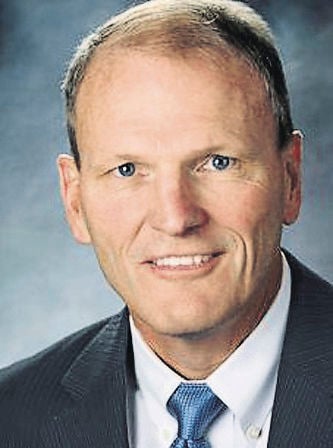The leaders of one of Dubuque’s largest employers say they are focused on continuing to grow the company, stressing that they plan to maintain a strong presence in the city moving forward.
After reporting a record year for total assets, deposits and income available to stockholders in 2021, HTLF leaders seek to continue pursuing future growth, according to President and CEO Bruce Lee and John Schmidt, independent chairman of the Board of Directors.
“It’s our vision to be a top-performing and admired banking organization, and we’re doing everything to deliver on that through disciplined growth strategies,” Lee said.
Lee and Schmidt shared their thoughts on HTLF’s future following recent public criticism and concerns about the company’s future raised by longtime executive Lynn B. Fuller and a group of shareholders since Fuller announced his retirement in February.
In announcing his resignation, Fuller expressed concerns about a board-approved move to consolidate the company’s 11 bank charters into one charter based in Colorado, a move that is expected to be complete by the end of 2023. Fuller said the move would result in the company moving its headquarters to Denver.
Fuller initially planned to retire in May from his position as HTLF’s executive operating chairman. However, he was removed as executive operating chairman of the Board of Directors last month, a week after he and a group of shareholders sent a letter to the board raising concerns about changes made by current company leadership and calling for a “better steward” for the organization.
Schmidt, who has been on the Board of Directors since 2001, then was appointed as independent chairman of the board. Schmidt has been senior vice president and chief financial officer at A.Y. McDonald Manufacturing Co. since 2013.
Lee and Schmidt said the decision to consolidate the charters to one in Colorado was based on a variety of factors such as the state’s strong economy, a regulatory body that has experience with larger and multi-state banking operations, and Colorado’s central location among HTLF’s banks.
However, that move will be more of a legal one than a physical one, they said.
Lee said two to four employees will move to Colorado with the charter consolidation, but the vast majority of HTLF’s infrastructure will remain in Dubuque. More than 500 of the company’s more than 2,100 employees work in Dubuque.
“We remain committed to the Dubuque market and the employees that we have here,” Lee said. “Truthfully, it would be wrong for us (to move) because of the great employee base, the historical knowledge, the infrastructure that we have. We’re not planning on moving any of that infrastructure.”
Lee and Schmidt also pointed to the company’s recent multimillion-dollar investment in the Roshek Building, which HTLF and Cottingham & Butler purchased in late 2019, as evidence of its commitment to the area.
Schmidt said the charter consolidation will create more efficiency for HTLF. For example, the company only will file one quarterly report with the Federal Deposit Insurance Corp. instead of duplicating the process 11 times.
At the same time, HTLF intends to maintain its banks’ local brands.
“So, everything the customer really touches and feels is the same, but we become a more efficient organization,” Schmidt said. “And as we all know, the world we’re in, to become a more efficient operation is critical to our long-term success.”
Schmidt said plans to consolidate the charters into one in Colorado were part of discussions when he worked at HTLF, so the idea is not new. Schmidt served as the company’s chief operating officer and chief financial officer before joining A.Y. McDonald.
Lee also noted that 2021 was a “record year” for HTLF, in part because of growth strategies and initiatives the business implemented. HTLF reported a record $19.3 billion in assets, a record $211.9 million in net income available to common stockholders and a record $16.4 billion in total deposits in 2021.
HTLF’s strategies include acquiring new talent and moving into new markets.
“We’re continuing to build a foundation, while at the same time, we are growing organically,” Lee said.
In their letter to HTLF’s Board of Directors last month, Fuller and other shareholders who collectively control about 6% of the company’s common stock expressed concerns that the company had “significantly underperformed the S&P bank index,” which they blamed the company’s decision to “abandon the culture that made for a successful community bank for its customers and employees.”
Asked about that criticism, Schmidt said the company’s multi-charter system is more costly than having one charter.
“There’s going to be a little bit of a challenge under earnings as we get through this consolidation because there’s a cost to it,” he said. “But once we’re on the other side of the charter consolidation and the inherent benefits to that, we would expect that the market would act accordingly.”
Lee said analyst comments on HTLF’s decision to consolidate its charters reinforced the thought that the move will increase the stock performance in the future.
“It’s a combination of things that we are executing,” he said. “We are not just focused on consolidating our charters. We are doing multiple things at once. We’re growing loans. We’re growing deposits while we’re doing this. It’s not just a one-focus strategy.”


